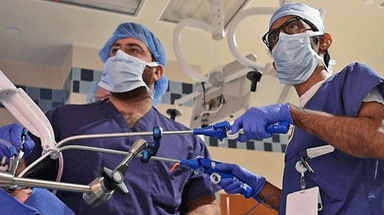Doctors and Robots: A Powerful Team in Cancer Surgery
"Robot-assisted surgery makes it possible to eliminate many of the most worrisome parts of removing head and neck cancer.”
Learn more from UPMC HealthBeat.UPMC Hillman Cancer Center is part of the UPMC family.
Starting Feb. 29, masking is optional but encouraged in UPMC medical facilities and most patient care settings.
Explore this Section
People with head, neck, or throat cancer are in good hands at UPMC Hillman Cancer Center. Our surgeons are experts in oncologic resections using cutting edge techniques, such as minimally invasive and robotic surgery, to remove cancerous and noncancerous head and neck tumors.
Surgical treatment for head and neck cancer often goes hand in hand with medical oncology or radiation therapy for the most success.
The goal of head and neck cancer surgery is to remove a tumor from the head and neck region.
You and your surgeon will discuss your options and the best approach for your type of cancer.
Surgery is often the most common treatment for people with head and neck cancer, depending on the type and stage of the cancer.
For some people, surgery alone may be the best treatment option.
For others, doctors may pair surgery with:
This will depend on the severity of the head and neck cancer.
Before surgery, radiation therapy combined with chemo can shrink larger tumors.
Traditional head and neck cancer surgery can leave people with:
Today, surgeons can remove many head and neck tumors using minimally invasive and robotic surgeries.
The common types of surgery for head and neck cancer are:
Compared to other approaches, minimally invasive and robotic head and neck surgery:
UPMC Hillman Cancer Center's surgical oncologists are highly trained in many advanced technologies and minimally invasive surgical techniques.
Minimally invasive surgery uses small “keyhole” cuts to remove your tumor. This allows for minimum damage to the surrounding tissues.
Robotic surgery can help the surgeon achieve an even greater degree of precision with little scarring and disruption to how you:
The robotic surgery system at UPMC uses a 3D image processor with interactive mechanical arms.
The joints on the arms follow the motions of the surgeon's hands. A camera arm allows the surgeon to see a detailed view of the procedure.
It's important to be prepared for head and neck cancer surgery.
Things you should avoid prior to surgery:
Dress comfortably, bring a small overnight bag. Bring glasses case (if applicable), list of medications, insurance card & driver’s license. Bring a driver.
Leave home any valuables such as jewelry, credit cards, etc.
You will arrive 2 hours prior to surgery. The surgery itself should take few hours. Plan to be at the hospital for the day.
The details of your surgery & recovery will be discussed with you by your surgeon. In general; you can expect to spend a couple of day’s in the hospital depending on the type of operation that you will be having. You may also need to spend some time in the ICU before completing your recovery in the hospital.
To learn more about Head and Neck Cancer or to make an appointment, you can:

Doctors and Robots: A Powerful Team in Cancer Surgery
"Robot-assisted surgery makes it possible to eliminate many of the most worrisome parts of removing head and neck cancer.”
Learn more from UPMC HealthBeat.